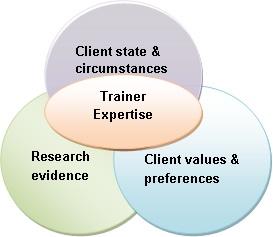Evidence-Based Approach to Fitness/Sports Performance
November 21 2010
From what I have seen, most folks have very little understanding of an evidence-based approach. They think EBP is all about taking the results of a study and just blindly applying it. This is called research utilization and is clearly NOT evidence-based approach.
So what is the definition of evidence-based approach?
As the figure shows, evidence-based approach involves the integration of the best available evidence with the trainer’s/coach’s expertise and the client values, goals, and circumstances.

Best available evidence from research
- Science of training: This part is the crux of an evidence- based approach and is called the “science of training”. The best evidence is obtained from high quality randomized experimental trials to determine the effectiveness of a particular workout program/supplement/diet and so on.
- Example: For example it is clear from reviews and meta-analysis that multi-sets are better than single sets to increase strength and muscle in intermediate and advanced lifters. It is clear from studies that supplementing creatine with your workouts helps with muscle growth and strength.
The experience and expertise of the coach/trainer
- Art of training: No evidence can replace the trainer’s/coach’s expertise and experience. This is what they call the “art of coaching or training”.You will never find a study where the subjects are exactly the same as your clients.
Ironically , the number one criticism against the evidence based approach is that evidence based approach ignores trainer’s/coach’s expertise and judgment and is just a cookie-cutter approach.
- The client’s age, training history, injury problems, biomechanical constraints, fitness assessments , stress level, personality , sleep, diet, genetics, skill can all have an influence on the effectiveness of the workout program and hence the evidence needs to be tailored to the individual client.
- Example: For example, an older client with stressful job will need much lower volume to maximize recovery. Also, the evaluation and correction of the exercise technique is solely dependent on the trainer’s experience and expertise
client concerns, values, circumstances, & preferences
- Client, client, & client: The client goals and preferences are important though the best evidence may not recommend this option . For example, taking long rest periods in between low reps when the client don’t want to sit around and waste time. Though the best evidence shows that long rest periods are optimal for low reps, this may not be the optimal decision strategy for that particular client.
- Example: I have come across numerous times when trainer makes the client do a lot of funky functional exercises on the ball when the client just wanted to lose weight. This is where the trainer’s preference is taking precedence over the clients preferences
The above is just a very brief introduction to the topic of evidence based approach.
There is certainly more to it like hierarchy of evidence, grading of evidence, appraising the evidence and so forth, but this article is certainly a good place to start. Unfortunately, in the fitness/performance field the research evidence part is missing and the decision making is solely based on the trainer experience/expertise and client goals and preferences.
Let me know what you think of the article.
Related Articles
| Fri November 26, 2010
Interesting post. I’ve got a few posts (and 100s of post plans) lined up for when I launch my site - there will probably be quite a bit of overlap between our sites (not a bad thing)!
I definitely think you’re right about the problem of a trainer’s style/goals conflicting with the client’s ones. Would you rate the usefulness of studies over a trainer’s experience or not?
| Fri November 26, 2010
Interesting post. I’ve got a few posts (and 100s of post plans) lined up for when I launch my site - there will probably be quite a bit of overlap between our sites (not a bad thing)!
I definitely think you’re right about the problem of a trainer’s style/goals conflicting with the client’s ones. Would you rate the usefulness of studies over a trainer’s experience or not?
Anoop | Fri November 26, 2010
Hi DOMS,
Thanks for the comment. Good to hear that you are launching a site and it is evidence based.
We have to go by experience and expert opinion because training is too multidimensional and dynamic and studies are static and too narrow.
And expert opinion is the least strongest evidence in the hierarchy of evidence. This is THE reason why evidence based approach evolved.
Hope you signed up in the forums.
| Fri December 17, 2010
Science and scientific evidence are lacking in a lot of the advice and tips gym buddies and trainers give out about fitness.
However, it sometimes seems people can’t even grasp the concept of “scientific evidence”.
Anoop | Sat December 18, 2010
Hi Frank,
Thanks for the comment. And I agree.
I don’t think there are many in the fitness field who can read/interpret research. I am still learning and there is a lot to it.
People don’t know why evidence based approach evolved. If people really understand the why, thats’ half the battle. Our brains are programmed to believe in anecdotes and story telling and less on studies.
>





